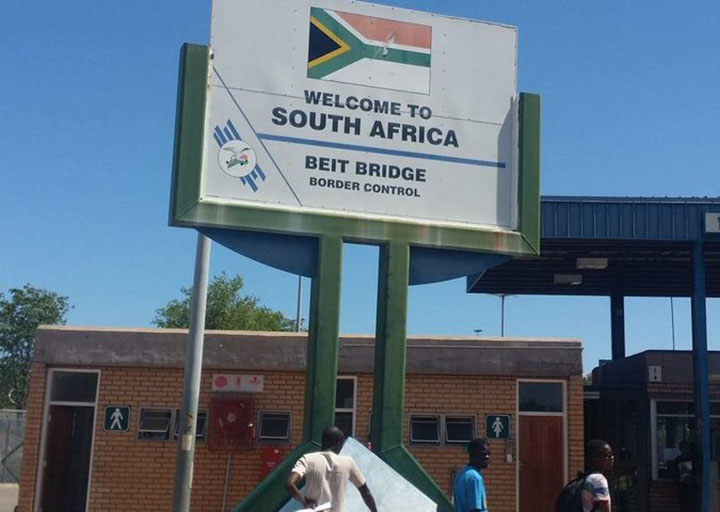Zimbabweans feel more at home in South Africa than Zimbabwe

I feel like a foreigner each time I visit home in Zimbabwe
When Petunia Sibanda came to South Africa from Zimbabwe in 2003, she arrived the way most people she knew did in those days – late at night, crossing over a dry patch of the Limpopo River that slices the two countries from each other, pretending not to see the crocodiles in the distance.
For several years, she lived her life in South Africa on the margins, constantly afraid her lack of legal status would be found out and she would be sent back home to a country where the economy was in free fall.
Then Ms. Sibanda found a lifeline. In 2011, she heard about a special visa for Zimbabweans, which would allow them to live and work in South Africa legally.

“I could live freely for the first time,” she says.
But the reprieve was always temporary. Last November, the South African government confirmed that it would no longer renew the 178,000 so-called Zimbabwe Exemption Permits it had issued. All ZEP holders, including Ms. Sibanda, had until the end of 2022 to get a different visa, or leave the country permanently.
Ms. Sibanda and tens of thousands of others in her position now face an existential question. Do they stay in the country where they have made their lives for the last decade, starting families and businesses, and become undocumented? Or do they return to the country they fled all those years ago, where conditions are perhaps even worse than a decade ago? How South Africa handles the issue in the coming months will set the tone in a region that, like elsewhere in the world, is grappling with growing xenophobia amid shrinking resources.
“We love our country, but we have nothing to go back to,” says Ms. Sibanda, whose four children were all born in South Africa.
Political points
Immigration has long been a hot-button political issue in South Africa. The country’s relative wealth, developed industries, and expansive legal rights for foreigners – at least on paper – have made it a popular destination for migrants from across Africa since the end of apartheid.
Today, it hosts more migrants than any other country in Africa. Simultaneously, though, amid high poverty and unemployment, anti-immigrant sentiment is often used by political leaders to rally working-class voters, and xenophobic violence flares regularly.
In practical terms, ZEP holders are a tiny fraction of South Africa’s migrant population, which is estimated between 3 million and 4 million people. But their case has taken on an outsize symbolic significance here, becoming a lightning rod in a wider debate about the role of migrants in the country.
When the government announced it would no longer renew ZEPs, the move was held up by political leaders as proof that they were doing something about South Africa’s rising unemployment and overstrained public services in the shadow of two years of a global pandemic. It came as an anti-immigrant vigilante movement called Operation Dudula – Zulu for “to beat back” – has organized sometimes-violent mass rallies around the country to intimidate immigrants.
For many Zimbabweans, making a new life in South Africa has been a halting, fraught process. Waves of xenophobic violence have swept the country several times in the past decade, targeting working-class foreigners and their businesses. Most recently, in 2021, many foreign-owned businesses were looted during widespread riots triggered by the arrest of former President Jacob Zuma on corruption charges, an issue entirely unrelated to immigration.
Terminating the ZEP “is an easy way to score points with voters,” says Loren Landau, a senior researcher at the African Centre for Migration and Society at the University of the Witwatersrand in Johannesburg. “It’s a populist move.”
Ironically, the ZEP has its origins in neighborly solidarity. When an economic crisis ricocheted across Zimbabwe in the early 2000s and its agricultural economy collapsed, the government there began furiously printing more money. By November 2008, inflation hit 79.6 billion percent, and political repression from the party of President Robert Mugabe, which had ruled the country since 1980, was deepening. The result was a mass exodus. Most of those migrants ended up in South Africa.
In response, the South African government created a permit called the Dispensation of Zimbabweans Project (DZP), which it called a “gesture of support and solidarity” with Zimbabwe – and which also relieved pressure on its own systems. South Africa’s government continued to replace the permit with similar visas until November 2021, noting that Zimbabwe remained in crisis and that Zimbabweans “have made notable contributions” to South African society.
“South Africa is my home”
Farai Mukucha was one of the Zimbabweans who arrived during the more fortunate days. He left Zimbabwe in 2007, and during his first years in the country scraped together a series of informal jobs. In 2010, he applied for the DZP, which allowed him to work formally for the first time as an electrician. He now runs his own business, and two of his three children were born in South Africa.

“To be honest with you, if I go to Zimbabwe now, I’ll be like a foreigner there,” he says. “Yes, it’s my home country, but South Africa is my home.”
Very few ZEP holders are eligible for other types of visas, says Luke Dzviti, chair of the Zimbabwe Immigration Federation, an organization formed earlier this year in order to bring a legal challenge against the government’s decision. As in countries like the United States, migrants in South Africa must prove they are critically skilled in certain professions, or that their employer could not find a South African who could do the job for which they are being hired.
The government insists the rules are necessary to protect jobs for South Africans, given that the country’s formal unemployment rate hovers around 34%. It has also argued that it needs to regulate scarce resources within the Home Affairs Department – which also issues IDs, passports, and other documents – for citizens. But a 2021 study for the Department of Employment and Labour found migrants’ presence in the country had little effect on major issues in the labor market like unemployment and low wages.
Crises around unemployment and public spending aren’t closely linked to migration, adds Mr. Landau of the African Centre for Migration and Society. Instead, they’re easy ways to drum up political support ahead of a 2024 national election that is widely expected to be the biggest challenge to the African National Congress, which has been in power since democracy in 1994.
Mr. Dzviti’s court challenge is one of three currently in motion challenging the legality of ending the ZEP.
“When government makes a decision with such consequences for the lives of so many people, the decision must be taken fairly, and we’ve argued that this one was not,” says Nicole Fritz, executive director of the Helen Suzman Foundation, which brought another of the court challenges. The foundation argues, among other things, that the government didn’t properly consult with those who would be affected by the change – a legal argument that has been used with success in other recent cases.
In response, South Africa’s Department of Home Affairs issued a statement calling the choice to challenge the government’s decision in courts “disturbing” and “sabotage” of South African democracy.
“The decision of the Minister not to extend the exemptions granted to Zimbabwean nationals has been widely supported by South African citizens,” wrote Home Affairs Minister Aaron Motsoaledi.
The three court cases will be heard together in October. Meanwhile, ZEP holders like Ms. Sibanda are in limbo.
“We are being thrown into the dark,” she says. “We don’t know what future is on the other side.”







